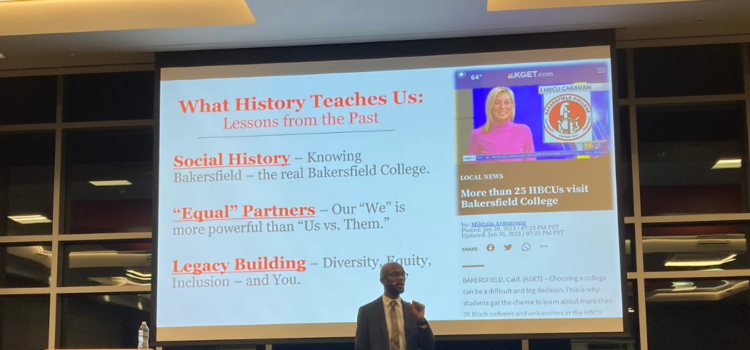
Dr. Eddie R. Cole is an Associate Professor of Higher Education and Organizational Change at the University of California, Los Angeles (UCLA), and the author of the critically acclaimed book The Campus Color Line: College Presidents and the Struggle for Black Freedom. Last week, Cole was scheduled to speak for February’s celebration of Black History Month and Bakersfield College’s (BC) Distinguished Speakers Series.
“I felt like his way of speaking was inspirational,” said Christina Paniagua, a student at BC. “I struggle to get my thoughts through and talk in front of people. Him being able to do it effortlessly with his perspectives was cool.”
Emerie Vae, a BC student who attended, stated she learned something new. During the discussion portion of the event, the audience and Cole candidly spoke about states and towns nationwide banning books.
“He taught me something new I didn’t know about. I guess the schools are trying to take away history, it’s not specifically history, but it has to do with history — it’s still a part of our history. I don’t think that’s right,” Vae said in regard to the discussion about banned books.
Cole’s presentation was titled The Campus Challenge: Race, History, and the Urgency of Action Now. He was properly introduced to the audience, with his many academic accolades being mentioned including 2015’s National Academy of Education/Spencer Foundation Postdoctoral Fellowship selection for his continued work in education research.
“If historians 50 years from now studied you and your work, what do you hope they would find and report?” Cole asked the audience to ponder the question throughout the presentation.
A clipping from The New York Times in 1961 was titled “Education: Campus Vs. Slums, Urban Universities Join Battle For Neighborhood Renewal.” This news article along with several others showed that historically, college communications and mainstream media framed Black neighborhoods as “slums” to drive the property value down and lower the public interest in desegregation in education.
Cole explains how chancellors and university presidents’ influences impacted housing, business, and especially all levels of education. This influence was often used to specifically target Black Americans negatively, using every aspect of life to discourage attendance at higher education institutions.
News clippings from the 1960s are used to help Cole share his message that understanding history and being a bridge between the generation before you and the one after you is important.
Cole finished with a slide that read “What History Teaches Us.” Three main points he wanted the audience to understand were that social histories are just as important as those presented in textbooks, and equal partners means finding ways to collaborate over creating divides between groups, and legacy building using diversity, equity, and inclusion.
Throughout the night Cole spoke about being passionate about truth-telling, saying that’s what helps him speak in front of crowds especially those who don’t agree with his message. He went on to state that he believes that there’s something about truth-telling that stays consistent.
“Remember that when it comes to The Campus Challenge: Race, History, and the Urgency of Action Now, is not just about this blatant person who is outright racist… It’s about those of us who sit passively on the sideline. The biggest hurdle toward true racial equality is not people who are out front trying to block it, it’s the people who actually do nothing when people are trying to block it,” said Cole. “Our challenge tonight is to really think deeply about what you can do, what action you can take?”